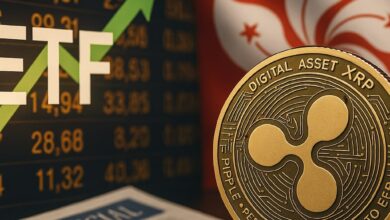Deloitte Survey: For Blockchain-Savvy Executives, Movement Expected Over Next Year and ‘Pragmatism’ the New Mindset

While commercial use of blockchain may still be limited, global executives with excellent-to-expert knowledge of the technology hold much more pragmatic views and look poised to make some major moves over the next year, according to a new Deloitte survey released this morning of more than 1,000 executives at major corporations across seven countries.
Deloitte unveils survey findings at Consensus 2018, showcases six new products and talks with Koch Industries about utilizing blockchain
While commercial use of blockchain may still be limited, global executives with excellent-to-expert knowledge of the technology hold much more pragmatic views and look poised to make some major moves over the next year, according to a new Deloitte survey released this morning of more than 1,000 executives at major corporations across seven countries.
“We are at an inflection point — momentum is shifting from a focus on ‘blockchain tourism’ and exploring the technology’s potential to building practical business applications,” said Linda Pawczuk, a principal with Deloitte Consulting LLP and the head of Deloitte’s U.S. financial services blockchain group. “I regard these blockchain-savvy executives’ views as a leading indicator. As more organizations put their resources behind this emerging technology, we expect blockchain to gain significant traction as its potential for greater efficiency, support for new business models and revenue sources, and enhanced security are demonstrated in real-world situations.”
According to the those surveyed, 74 percent report that their organizations see a “compelling business case” for the use of blockchain; many of these companies are moving forward with the technology. About half of that number (34 percent) say their company already has some blockchain system in production, while another 41 percent of respondents say they expect their organizations to deploy a blockchain application within the next year.
In addition, nearly 40 percent of respondents reported that their organization will invest $5 million or more in blockchain technology in the coming year.
This indicates that the coming year will be one of significant commercial blockchain activity, at least among those companies already active with the technology. Still, 22 percent of global respondents – and 30 percent of U.S. respondents – say they still lack a compelling application to justify its implementation.
The survey findings reveal other bullish indicators as well:
- Eighty-four percent of respondents agreed that blockchain is broadly scalable and will reach mainstream adoption.
- Fifty-nine percent believe in blockchain’s potential to disrupt and revolutionize their industries, and the overall economy.
- More than 2 in 5 (43 percent) of respondents identify blockchain as one of their “top five strategic priorities.”
- When asked which blockchain use cases they are working on, 53 percent of respondents identified supply chain-focused systems, 51 percent reported Internet of Things integration projects and over 40 percent highlighted efforts around digital records. Among other mainline uses of the technology, 30 percent said they were creating payments applications and 40 percent identified digital currency projects as those they were invested in producing.
- Almost 30 percent of respondents have already joined an existing consortium, with 45 percent saying they are likely to join one within the next year. And more than 13 percent say they are interested in starting a consortium of their own.
Despite respondents’ interest in blockchain’s capabilities, nearly 39 percent of the broad global sample said they believe blockchain is “overhyped.” In the United States, meanwhile, this number is higher: 44 percent of respondents view blockchain as “overhyped,” up from 34 percent in a 2016 survey by Deloitte.
“While this may seem like blockchain is trending in the wrong direction, we believe this change in attitude is more reflective of the shift toward the pragmatists in the blockchain community,” said Pawczuk.
“We’re still early in blockchain’s development, so fits and starts in its maturation are not surprising.” said Joe Guastella, a principal with Deloitte Consulting LLP and global leader of Deloitte’s financial services consulting team. “In financial services, the technology has already inspired the industry to re-examine processes and functions that have been static for decades. We are broadly seeing applications in production – as well as developing them ourselves for clients – and we believe this momentum will continue.”
The survey – conducted in March and April 2018 – was unveiled at Consensus 2018 in New York, the world’s biggest blockchain-focused conference. A broader report on the survey’s findings will be released in June.
At the event, Deloitte is also showcasing a half-dozen blockchain-focused products in its demo lab from the broader network of Deloitte member firms. These efforts – new to the blockchain world – are led by a secure platform that uses blockchain hardware known as crypto tags to give physical goods a digital identity that cannot be altered, essentially creating a “digital twin.” It can help guarantee the integrity and the whereabouts/conditions of freight along supply chains, as well as enable real-time surveillance and marketplace capabilities by smart contract and wallet-based settlements.
Other efforts include:
- A product combining data integrity checks with machine learning techniques to identify behavior associated with malware.
- A business-to-government portal for communications, regulatory compliance and financial reporting.
- EduScrypt, which facilitates the real-time validation and sharing of certified qualifications, meeting regulatory requirements and enabling organizations to better manage professional qualifications.
- Exploring the interoperability between blockchains through GlobalConnect, a working model for duplicated input check among two different blockchain platforms.
- A product that allows near real-time tracking and tracing along a digital chain of custody, enabling all stakeholders to manage goods on a shared ledger from registration to delivery of finished products.
Deloitte’s presence at Consensus also included a conversation between Pawczuk and legal experts from Koch Industries. The discussion focused on how patents and other types of intellectual property are playing an increasingly important role in the economy, yet key aspects of managing IP not having changed in decades. This disconnect can result in waste, unnecessary risks and missed opportunities – a challenge that blockchain could help solve.
As revealed at the event, Koch Industries – one of the largest private companies in America – is working with Deloitte and others to build an industry-led platform to decrease operational costs, increase ownership verifiability and transparency and enable new insights and services in this area.
Long recognized as a leader in blockchain technologies, Deloitte and its network of member firms have more than 1,300 people across the globe focusing specifically on digital ledger technology across all industries.




